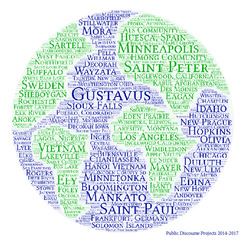Public DiscourseCOM 120
Course Description
Student Learning Outcomes
- Effectively create and present oral, written, and mediated communication. Effective communication is contextual and contributes to deliberative discourse by identifying issues, adapting to audiences, marshaling arguments and evidence, and employing appropriate presentation standards.
- Find and utilize relevant and reliable library and community-based evidence.
- Ethically engage in research, interactions with community members, and in presentations according to project guidelines: Community-based (local, collaborative, sustainable, appropriate), Deliberative (evidence-based), and Ethical (reflexive).
- Effectively engage in opportunities for positive social change.
- Articulate a plan for continued skill and content development based on accurate assessment of strengths and areas for growth.
The Public Advocacy Project
Public Discourse Text
What do students say about the Public Discourse experience?
"I have indubitably grown as a student, a community member, and a member of the human race from my experience with my Public Discourse project. I have gained insights about persuasion and advocacy, gained skill in persuasion and connecting to community members, and gained a better sense of what it means to be an ethical member of my community. I intend to continue to develop the skills I have discovered through my project throughout my years at Gustavus and in my future career." - Spring '22 student
"Before this class I did not think it was possible to be able to address a problem in my community and that you had to be a person of authority to address community problems, but I realize now that is not true at all. Through public advocacy, civic engagement, and leadership, problems can be addressed in communities and be changed for the better." - Spring '22 student
"I am happy that I got to take this class because it helped me grow so much as a person. I learned how to advocate for an issue in my community and gained a lot of research knowledge that can help me address more issues in the future. This class helped me to know how to go about it and what to do to overcome challenges. I also created relationships with people that I wouldn’t have thought I would have because of this class. I learned to listen to others and respect their opinions. " - Spring '22 student